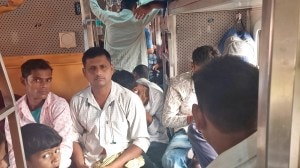Lead to feed is prize message
What Brazil and Ghana did to tackle hunger,and where India stands on this count
The selection of this years World Food Prize winners,former Presidents of Brazil and Ghana,is a recognition of the role political leadership can play in ensuring food security and in effect a reminder about the challenges before India.
All previous awards had gone to agronomists,experts or activists. This years awards have,for the first time,underscored the role of public policy and action and political will to fight hunger. John Agyekum Kufuor and Luiz Inacio Lula da Silva have achieved this by striking synergy between technology and public policy, M S Swaminathan,the first WFP laureate and now chairman of the jury,told The Indian Express.
India still debates the demarcation of the poverty line and the number of people below it. Ghana,during the terms of President Kufuor from 2001 to 2008,halved its poverty rate from 51.7 to 26.5 per cent,and reduced the hunger index from 34 to 9. And Brazil,during Lulas stint,implemented a programme to bring down those living in extreme poverty from 12 per cent of the population to 4.8 per cent.
In the 2011 global hunger index ranking released by the International Food Policy Research Institute,India is in the bracket of alarming countries,ranked 67 among 81.
Brazilian example
In Ghana,Kufuor brought in private purchasers for the cocoa produce,raising incomes. He encouraged farm mechanisation which,rather than cause unemployment,helped draw educated village youths to farms.
Brazil scored with cash transfers,an area where India continues to vacillate. Many experts have been pitching for conditional cash transfers in India. Augmenting peoples purchasing power is crucial to rural economy, says Milind Murugkar,a food policy expert. How,has been shown by Brazil.
We offered $50 to each poor family, Lula said in his speech. Critics said we are creating an army of shirkers who would be too happy to receive the aid and just do nothing. But we had put the condition that they will have to compulsorily send their children to school where they would get nutritious food. Nutritious food scheme created a demand for more food and we encouraged the farmers to produce more.
Speakers at many WFP symposia also stressed the need for enhanced focus on women in agriculture. The idea should be to increase womens access to land and other resources, said Ritu Sharma,head of Washington-based WomenThrive that is working with groups in India too.
Brazil transferred the cash in the account of the woman in the family.
ActionAid,an anti-poverty NGO,reports: Cycles of debt and crop losses have led to scores of farmer suicides,leaving widows to cope with managing households and providing enough food to their families. India is witnessing feminisation of agricultural workforce as men migrate to off-farm work. Yet womens role in agriculture continues to be undervalued.
Other challenges
Indias problems include small land-holdings that are getting further fragmented down the generations,necessitating not only a dramatic productivity raise to sustain poor farmers but also creation of enough viable alternatives to agriculture.
At a symposium on the WFP sidelines,CEOs of global agro-manufacturing giants such as Pioneer and Monsanto called for spread of technology in regions like Asia and Africa. Concerns about bio-safety of GM crop,however,have become a hurdle. Said Shanthu Shantharam,president of Biologistics International,Washington,One of the main challenges is to remove misconceptions around biotechnology since it is most crucial for future hunger needs.
On adaptation to climate changes,ActionAid findings show India as the seventh most vulnerable country. On preparedness to tackle it,India is ranked 18th among 28 countries.
(The correspondent was in a group of 28 journalists from various countries who attended WFP events and visited institutions working on food security)





- 01
- 02
- 03
- 04
- 05


























